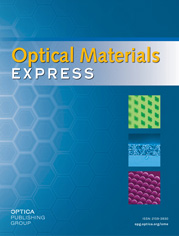Optical Materials Express Feature Issue
Nonlinear Nanophotonics
Submissions Open: 1 June 2024
Submission Deadline: 1 September 2024
Nonlinear nanophotonics is vital to modern telecommunications, computing, quantum technology, and metrology innovation. This feature issue will highlight recent advances and trends in nonlinear optics at the nanoscale, with a focus on materials science and nanotechnology in nonlinear optics, as well as research on free-space and on-chip nonlinear optics, quantum nanophotonics, and novel material platforms, such as polaritonic materials, strongly correlated materials, topological insulators. Submissions on perturbative and non-perturbative nonlinear responses across the spectral ranges from UV to THz, and contributions reporting new fundamental phenomena, device applications, experimental characterization, and theoretical modeling are welcome.
Topics to be covered include but are not limited to:
- Theory and fundamentals of nonlinear optics in nanomaterials
- Harmonics generation, parametric down-conversion, and other perturbative nonlinear effects in nanostructures and photonic integrated circuits
- Nonlinear optics in topological materials, strongly correlated materials, superconductors, and other exotic materials
- Material platforms for integrated photonics, CMOS optoelectronics, heterogeneous integration, and photonic computing
- Nonlinear polaritonics, plasmonics, phononics and excitonics
- Quantum nanophotonics
- Ultrastrong and non-perturbative nonlinear optics and refractory materials
- Far-infrared and THz nonlinear optics
- Nonlinear optics for metrology
- Light-induced damage in nanomaterials
Manuscripts must be prepared according to the usual guidelines for submission to Optical Materials Express and must be submitted online through the Prism submission system. When submitting, authors should specify that the manuscript is for the "Nonlinear Nanophotonics" feature issue (choose from the drop-down menu).
Feature Issue Guest Editors:
Maxim Shcherbakov, University of California, Irvine, USA (Lead Editor)
Mengjie Yu, University of Southern California, Los Angeles, USA
Gregory Moille, Joint Quantum Institute—University of Maryland/NIST, USA
Sebastian Schultz, University of St. Andrews, UK
Yuri Kivshar, The Australian National University, Canberra, Australia
Robert Boyd, University of Ottawa, Ottawa, Canada, and Rochester University, Rochester, USA

